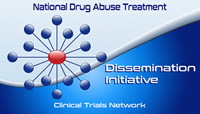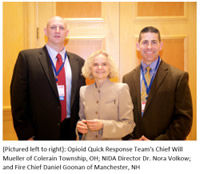The CTN Dissemination Initiative |
SHARE ISSUE ON |

|
|
|
 Accelerating the dissemination of research-based drug abuse treatment into clinical practice is a priority for the National Institute on Drug Abuse (NIDA) and represents the core mission of the Clinical Trials Network (CTN) Dissemination Initiative. Accelerating the dissemination of research-based drug abuse treatment into clinical practice is a priority for the National Institute on Drug Abuse (NIDA) and represents the core mission of the Clinical Trials Network (CTN) Dissemination Initiative.
This initiative incorporates collaboration between clinicians, scientists, and experienced trainers to catalyze the creation of user-friendly treatment tools and products and facilitate the adoption of research-based interventions into front-line clinical settings. Some of these activities were formerly described as the NIDA/SAMHSA Blending Initiative.
The CTN Dissemination Initiative comprises three components intended to facilitate the adoption of research-based interventions into front-line clinical settings:
- Products and materials based on NIDA-supported research,
- Meetings and conferences, and
- Collaborative partnerships (including mentored training awards).
Learn more about the CTN Dissemination Initiative here. . .
· · · · · · · · · · · · · · · · · · · · · · · · · · · · · · · · · · · · · · · ·
NIH Launches HEAL Initiative to Accelerate Scientific Solutions to the Opioid Epidemic
 At the 2018 National Rx Drug Abuse and Heroin Summit, National Institutes of Health Director Francis S. Collins, M.D., Ph.D., announced the launch of the HEAL (Helping to End Addiction Long-term) Initiative, an aggressive, trans-agency effort to speed scientific solutions to stem the national opioid public health crisis. Toward this effort, NIH is nearly doubling funding for research on opioid misuse/addiction and pain from approximately $600 million in fiscal year 2016 to $1.1 billion in fiscal year 2018, made possible from a funding boost by Congress. NIH’s efforts contribute to a government-wide push to meet the President’s goal of ending the opioid crisis. At the 2018 National Rx Drug Abuse and Heroin Summit, National Institutes of Health Director Francis S. Collins, M.D., Ph.D., announced the launch of the HEAL (Helping to End Addiction Long-term) Initiative, an aggressive, trans-agency effort to speed scientific solutions to stem the national opioid public health crisis. Toward this effort, NIH is nearly doubling funding for research on opioid misuse/addiction and pain from approximately $600 million in fiscal year 2016 to $1.1 billion in fiscal year 2018, made possible from a funding boost by Congress. NIH’s efforts contribute to a government-wide push to meet the President’s goal of ending the opioid crisis.
HEAL will bolster research across the NIH to prevent addiction through enhanced pain management and improve treatments for opioid misuse disorder and addiction. Learn more about this initiative here. . .
|
CTN Trial Progress
 Study results for Open Studies as of the April 26 trial Progress Report. Study results for Open Studies as of the April 26 trial Progress Report.
CTN-0064 - Linkage to HCV Care.
Enrolled 113
CTN-0067 - CHOICES Scale-Up. Enrolled 9
CTN-0068 - ADAPT-2 for Methamphetamine Use Disorder. Enrolled 173
CTN-0069 - OUD in the Emergency Department. Enrolled 275
CTN-0073 - Detecting Cocaine Use Using Smart watches. Enrolled 19
CTN-0075 - Physician-Pharmacist Collaboration - OUD
Enrolled 20
Total Enrolled in all Studies: 24,715
|
· · · · · · · · · · · · · · · · · · · · · · · · · · · · · · · · · · · · · · · ·
News from the National Institute on Drug Abuse (NIDA)
 NIDAMED Meets with ADA About Opioid Prescribing in Dental Practice NIDAMED Meets with ADA About Opioid Prescribing in Dental Practice
On March 28, NIDA’s Medical & Health Professionals initiative (NIDAMED) brought together leaders of the American Dental Association (ADA) to meet with NIDA Director Dr. Nora D. Volkow, NIH Deputy Director Dr. Lawrence A. Tabak, and NIDCR Director Dr. Martha Somerman to discuss ways the oral health profession is addressing the opioid crisis. The meeting was timely as the ADA has just announced a visionary new policy on opioid prescribing: requiring its membership to take continuing education courses in prescribing opioids and other controlled substances, including statutory limits on opioid dosage with duration of no more than seven days for the treatment of acute pain. These steps are consistent with the new Centers for Disease Control and Prevention evidence-based guidelines. The ADA also recommends that dentists use and register with Prescription Drug Monitoring Programs (PDMPs) to promote the appropriate use of opioids and deter misuse and abuse. This initiative builds upon ADA policy adopted in 2016 which recommended that dentists should consider nonsteroidal anti-inflammatory analgesics as the first-line therapy for acute pain management. Drs. Volkow, Somerman, and Tabak also discussed with ADA leadership possible research projects that could further identify best practices to deter opioid misuse in oral health management.
 First Responders Meet with NIDA's Dr. Nora Volkow About the Opioid Crisis First Responders Meet with NIDA's Dr. Nora Volkow About the Opioid Crisis
First responders connected with NIDA Director Dr. Nora Volkow to discuss policies, strategies, and future research on substance use disorder treatment (SUD) in the midst of the opioid crisis at the NIDA Clinical Trials Network (CTN) 2018 Annual Steering and Scientific Meeting. This meeting provided a unique forum for the exchange of research findings on treatment and prevention and exploration of how these findings can inform clinical practice, health care policy, and future research directions. Topics at the meeting covered safe and effective medications for opioid use disorder (OUD) treatment, better treatment through use of big healthcare data, improved screening in routine medical care, improvement of clinical practice through electronic health record data, alternative outcome measures of effective OUD treatment, treatment models in primary care, women-specific treatment issues, and OUD prevention and treatment for youth.
 NIDA and the American Chemical Society Talk Opioids NIDA and the American Chemical Society Talk Opioids
On February 27, Dr. Rita Valentino, Director of the Division of Neuroscience and Behavior at the National Institute on Drug Abuse presented as an expert on a closed circuit event to chemistry students called "Opioids: Combatting Addiction with Chemistry,"” as part of the American Chemical Society's "Program-in-a-Box" series.
This event explained what makes opioids so addictive, the treatments and medications used to help those who suffer, and profiled the work that chemists are doing to make prescription painkillers safer and harder to abuse. Over 6,100 students were in attendance for this event, which taught students about fighting opioid addiction with chemistry. For more information on this event, here is a brief summary document of the details.
· · · · · · · · · · · · · · · · · · · · · · · · · · · · · · · · · · · · · · · ·
News from the Nodes
Northeast Node
 Two community partners of the Northeast Node, the New Hampshire Citizens Health Initiative and Maine Quality Counts, alongside the Vermont Program for Quality in Health Care, are collectively leading the Health Resources and Services (HRSA)-funded Northern New England (NNE) Project ECHO (Extension for Community Healthcare Outcomes) Network across Maine, New Hampshire, and Vermont.
Two community partners of the Northeast Node, the New Hampshire Citizens Health Initiative and Maine Quality Counts, alongside the Vermont Program for Quality in Health Care, are collectively leading the Health Resources and Services (HRSA)-funded Northern New England (NNE) Project ECHO (Extension for Community Healthcare Outcomes) Network across Maine, New Hampshire, and Vermont.
NNE ECHO is an expansive collaborative designed to implement a regional network of telehealth services using the Project ECHO model to improve access, care delivery, outcomes and health for Northern New Englanders residing in Maine, New Hampshire and Vermont. The Project ECHO model is an evidence-based method developed by researchers at the University of New Mexico that links teams of interdisciplinary specialists with primary care clinicians often in hard-to-reach and/or underserved areas. Unlike telemedicine where the focus is on direct service delivery from a specialist to a remote patient, during teleECHO sessions, the focus is on the sharing of knowledge from multidisciplinary expert mentors and teams across a virtual network via case-based learning to primary care practice teams. Through ECHO, providers are able to work with their patients to treat complex, chronic and common conditions effectively, safely, and compassionately within their own communities.
In February 2018, the NNE ECHO launched their first series on the Continuity of Care for Substance Use and Exposure during the Prenatal Period. A wide range of medical providers in Maine, New Hampshire, and Vermont have been joining monthly sessions to share cases and learn evidence-based care approaches for women with substance use problems during pregnancy and how to identify strategies, best practices, screening tools, resources, and emerging topics in the field. A Northeast Node core investigator, Daisy Goodman, MSN, DNP, MPH, APRN, CNM, is providing expertise for the series. The early results from the program evaluation have been overwhelmingly positive. Upcoming NNE ECHO series will be focused on Medication Assisted Treatment for Opioid Use Disorder and Dementia Care.
Follow the Northeast Node on Twitter and Facebook.
Texas
 CTN-0068 ADAPT-2 is nearly halfway to its enrollment target and sites have been able to increase various performance metrics in spite of the stubborn cold weather! CTN-0068 ADAPT-2 is nearly halfway to its enrollment target and sites have been able to increase various performance metrics in spite of the stubborn cold weather!
In particular, we would like to recognize UCLA and SURUfor having the highest primary outcome availability and consistently high recruitment! As of April 23rd we have randomized 173 participants across all the sites.
We also launched our first national branding ad campaign, with its very own central toll-free number, for the study and will have results from that campaign in the next month. Another ad campaign being piloted is a visual ad banner on a popular music streaming service, to be launched in May.
In the upcoming months, study retention will continue to be the main focus with sites sharing their resourceful tips and tricks during monthly Recruitment & Retention calls to help keep participants engaged. With weather starting to warm up, our sites are getting ready to ramp up! |
Mid-Southern
 The CTN-0075 (Pharm-OUD-Care) Lead Team is pleased to report that all 3 clinic-pharmacy paired sites have received endorsement and have begun enrollment. As of April 25th, 2018, a total of 13 participants have been enrolled and entered into the pharmacy maintenance phase of the study where suboxone maintenance care will be administered at a pharmacy for 6 months. The CTN-0075 (Pharm-OUD-Care) Lead Team is pleased to report that all 3 clinic-pharmacy paired sites have received endorsement and have begun enrollment. As of April 25th, 2018, a total of 13 participants have been enrolled and entered into the pharmacy maintenance phase of the study where suboxone maintenance care will be administered at a pharmacy for 6 months.
We thank NIDA, the CCTN, the CCC, and the DSC for their continued support to this important study to potentially increase treatment access for opioid use disorder. We also thank the study physicians and pharmacists for all their hard work and dedication to the study.
Recent Publications from the Mid Southern Node:
- Wu LT, Ghitza UE, Zhu H, Spratt S, Swartz MS, Mannelli P. Substance use disorders and medical comorbidities among high-need, high-risk patients with diabetes. Drug Alcohol Depend 2018;186:86-93. [Find it in CTN Library]
- John WS, Zhu H, Mannelli P, Schwartz RP, Subramaniam GA, Wu LT. Prevalence, patterns, and correlates of multiple substance use disorders among adult primary care patients. Drug Alcohol Depend 2018;187:79-87. [Find it in CTN Library]
- Subica AM, Wu LT. Substance use and suicide in Pacific Islander, American Indian, and multiracial youth. Am J Prev Med 2018: S0749-3797(18)30076-X. doi: 10.1016/j.amepre.2018.02.003.[Full article for subscribers]
Pacific Northwest
 The Pacific Northwest Node is delighted to announce that in March 2018, Dr. Mary Hatch-Maillette was named Co-Director of the Pacific Northwest Node. The Pacific Northwest Node is delighted to announce that in March 2018, Dr. Mary Hatch-Maillette was named Co-Director of the Pacific Northwest Node.
Having joined the University of Washington’s Alcohol & Drug Abuse Institute in 2003 to work on CTN-0018, Safer Sex for Men, she has since held a variety of local and national roles in seven additional CTN protocols and two platform studies, including the BEing Safe in Treatment (BEST) study.
 In addition, she maintains a private psychotherapy practice in Seattle. Her primary research interests are in substance use treatment and HIV risk behavior. In addition, she maintains a private psychotherapy practice in Seattle. Her primary research interests are in substance use treatment and HIV risk behavior.
Now one of the longest-serving members of the Pacific Northwest Node and a CTN "veteran," Dr. Hatch-Maillette has co-authored 45 papers, posters, and presentations for the CTN. She is excited to join the CTN leadership and continue the PNW Node’s tradition of blending science and practice in the treatment of substance use disorders. |
· · · · · · · · · · · · · · · · · · · · · · · · · · · · · · · · · · · · · · · ·
 New in the CTN Dissemination Library New in the CTN Dissemination Library
Sex Differences in Opioid Use and Medical Issues During Buprenorphine/Naloxone Treatment. Barbosa-Leiker C, et al. American Journal of Drug and Alcohol Abuse 2018 (in press).
The Effect of N-Acetylcysteine on Alcohol Use During a Cannabis Cessation Trial. Squeglia LM, et al. Drug and Alcohol Dependence 2018;185:17-22.
Barriers and Facilitators Affecting the Implementation of Substance Use Screening in Primary Care Clinics: A Qualitative Study of Patients, Providers, and Staff. McNeely J, et al. Addiction Science & Clinical Practice 2018;13:8.
Prevalence, Patterns, and Correlates of Multiple Substance Use Disorders Among Adult Primary Care Patients. John WS, et al. Drug and Alcohol Dependence 2018 (in press).
A Psychometric Evaluation of the Concise Health Risk Tracking Self-Report (CHRT-SR) -- A Measure of Suicidality -- in Patients with Stimulant Use Disorder. Sanchez K, et al. Journal of Psychiatric Research 2018 (in press).
· · · · · · · · · · · · · · · · · · · · · · · · · · · · · · · · · · · · · · · ·
From the ATTC
 ATTC Messenger, April 2018 ATTC Messenger, April 2018
Featured article: Destroying Addiction Stigma Once and For All: It’s Time! by Flo Hillard, MS
From the ATTC/NIATx Service Improvement blog
New Resources from the ATTC Network
Prescription Opioids and Heroin Patient Education (pdf)
Language of Recovery (pdf) |
Also of Interest
 Last Chance for AHSR Abstracts! Last Chance for AHSR Abstracts!
The deadline to submit an abstract for the 2018 Addiction Health Services Research (AHSR) Conference is 5pm ET on May 1, 2018. No more procrastinating -- submit your abstract today!
 Ensuring Success Through Smarter Site Selection and Study Feasibility -- CTN Clinical Trials e-Learning Ensuring Success Through Smarter Site Selection and Study Feasibility -- CTN Clinical Trials e-Learning
May 3, 2018, 1-2:30pm ET
Site selection is a complex dance between sponsors and sites. The wrong choice can have serious consequences, impacting quality, time, and finances for both the sponsor and investigator. In this web seminar, the steps for site selection and study feasibility will be discussed. Register here.
|
   
|